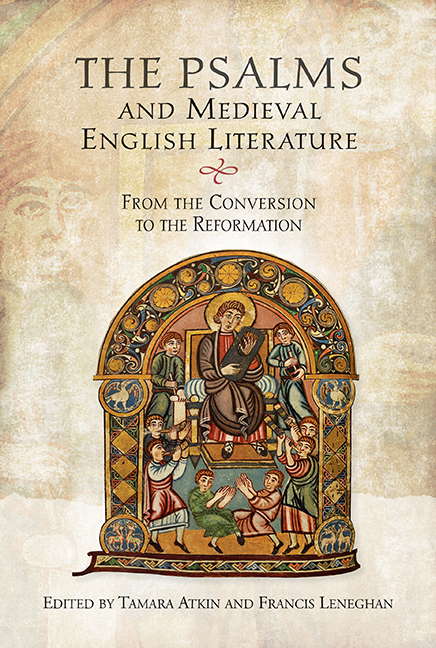Book contents
- Frontmatter
- Contents
- Figures
- Contributors
- Preface
- Acknowledgements
- Abbreviations
- Miscellaneous Frontmatter
- Introduction A Case Study of Psalm 50.13 in Old and Middle English
- I Translation
- 1 Some Anglo-Saxon Psalters and their Glosses
- 2 The Eadwine Psalter and Twelfth-Century English Vernacular Literary Culture
- 3 ‘In eching for the beste’: the Fourteenth-Century English Prose Psalter and the Art of Psalm Translation
- 4 The Wycliffite Psalms
- 5 Rolle's English Psalter and the Possibilities of Vernacular Scriptural Commentary
- II Adaptation
- III Voice
- Index
4 - The Wycliffite Psalms
from I - Translation
Published online by Cambridge University Press: 09 May 2017
- Frontmatter
- Contents
- Figures
- Contributors
- Preface
- Acknowledgements
- Abbreviations
- Miscellaneous Frontmatter
- Introduction A Case Study of Psalm 50.13 in Old and Middle English
- I Translation
- 1 Some Anglo-Saxon Psalters and their Glosses
- 2 The Eadwine Psalter and Twelfth-Century English Vernacular Literary Culture
- 3 ‘In eching for the beste’: the Fourteenth-Century English Prose Psalter and the Art of Psalm Translation
- 4 The Wycliffite Psalms
- 5 Rolle's English Psalter and the Possibilities of Vernacular Scriptural Commentary
- II Adaptation
- III Voice
- Index
Summary
The Wycliffite Bible was the first complete translation of the Vulgate in English, produced at the end of the fourteenth century by the followers of the Oxford theologian John Wyclif. The translation was condemned and banned within twenty-five years of its appearance but nevertheless became the most widely disseminated medieval English text — it survives in around 250 complete and partial copies. The Wycliffite Bible includes one of several surviving Middle English versions of the complete Psalter. The present chapter focuses on two aspects of the Wycliffite Psalms: their circulation and audience, and translation techniques evident in two surviving redactions of their text. These aspects are almost certainly interconnected: a remarkably liturgical character of the manuscripts of the Wycliffite Bible suggests their use by the clergy. A highly literal nature of both versions of the translation, the scholarly apparatus that accompanies them in manuscripts and a desire for precision evident in their language all indicate that they would have appealed to the learned. Earlier discussions of the translators’ care to render Latin grammatical constructions correctly, manifest in the biblical text and its analysis in the General Prologue to the Wycliffite Bible, are supplemented here for the first time by a discussion of efforts to establish appropriate vernacular biblical vocabulary. This aspect of the translators’ work, not mentioned by the author of the prologue and largely overlooked in previous scholarship, must have been, as shown below, a major part of the revision from the Earlier (EV) to the Later Version (LV) of the Bible. All this sheds a new light on the Wycliffite translation: whereas earlier scholarship assumed its popular nature because of its status as a vernacular text and polemical statements by Wycliffite authors about broadening access to Bible, the current discussion draws attention to professionalism in both its execution and likely use.
Circulation and Audience
The Book of Psalms was better known in the Middle Ages and more widely circulated than any other biblical book, not only because of the high regard for its theological, poetic and instructional value, but also because of its exceptional importance in liturgy. The Rule of St Benedict, which formed the basis of the rules of most medieval religious orders, obliged monks and nuns to recite all 150 Psalms in the course of each week.
- Type
- Chapter
- Information
- The Psalms and Medieval English LiteratureFrom the Conversion to the Reformation, pp. 128 - 148Publisher: Boydell & BrewerPrint publication year: 2017



